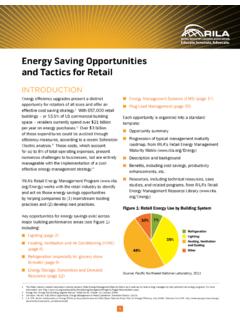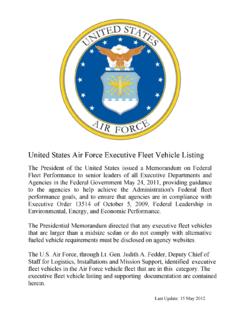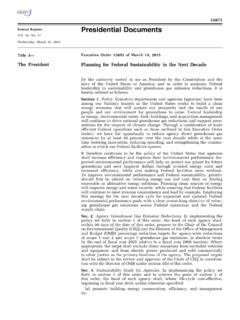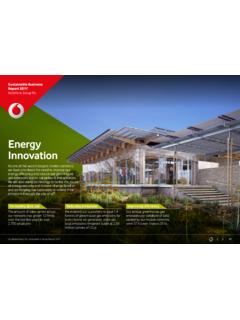Transcription of Retail Strategies to Reduce the Environmental Impact of ...
1 Retail Strategies to Reduce the Environmental Impact of Product Transportation Introduction Now more than ever, Retail companies are seeking to measure, track, report, and address the impacts that their operations have on the environment. Doing so can address the interests of their key stakeholders while driving business performance through efficiencies and innovations. This white paper highlights Strategies that retailers may use to lessen the Environmental impacts from product transportation. As the hierarchy of transportation Strategies illustrates, some Strategies have limited but immediate Impact , while others target longer-term, systemic change.
2 Today s customers expect stores to carry a wide range of products that may be manufactured in all parts of the world. Product transportation, therefore, is a critical part of the Retail equation. Transportation also involves fuel consumption that emits carbon dioxide and particulates, and represents a significant cost for the industry. Each retailer develops its own strategy to address transportation Environmental impacts. A recent survey of RILA members compiled the many Strategies that retailers are currently implementing. The list below highlights some of these measures.
3 Carrier Engagement Partnerships and Collaborations Many retailers hire third party carriers and lack direct control over their delivery fleet as a result. One tool such retailers can use is to engage their carriers to promote sustainable transportation practices. A retailer might: Encourage its carriers to actively identify, prioritize, and mitigate Environmental impacts. Encourage its carriers to participate in EPA SmartWay, the Coalition for Responsible Transportation, or another organization. Ask its carriers to disclose what they are doing or planning to do to eliminate carbon intensive fuels.
4 A variety of collaborations have developed to help retailers address the Environmental impacts of transportation. Working with these organizations provides retailers with additional resources and education. Key partnerships include: EPA SmartWay, which reduces transportation-related emissions by creating incentives to improve supply chain fuel efficiency. Coalition for Responsible Transportation, which works with its private sector members in partnership with America's ports to establish clean action plans to develop and implement industry-supported clean truck programs that are both environmentally and economically sustainable.
5 BSR Clean Cargo Working Group, a group dedicated to Environmental performance improvement in marine container transport through measurement, evaluation, and reporting. BSR s Future of Fuels, helps companies understand the greatest sustainability impacts of their transportation fuel system, and what they can do about them. Technologies Processes Carrier engagement Partnerships Hierarchy of Transportation Strategies Technologies Processes and Practices Deploying the right technologies can improve the fuel efficiency of a retailer s fleet and Reduce the Environmental impacts of trucks procured in the future.
6 Example technologies used by retailers for this purpose include: Auxiliary power units that provide the operator with heating, air conditioning, and electrical power while the vehicle is not moving. Doing so eliminates the need for the engine to run when the driver is resting. Advanced tires and auto inflation devices to Reduce the weight and rolling resistance of the wheels, and ensure optimal tire pressure. Wind fairings, aerodynamic skirts, and fuel tank covers to Reduce the vehicle s wind resistance. Route optimization technologies to minimize miles traveled.
7 Hybrid fuel-electric engines that are more efficient than their conventional counterparts. Alternative fuels, such as natural gas, biodiesel, and electricity, which are less carbon intensive than traditional fuels. Transportation fuel use is also impacted by the processes and practices followed by a Retail company. Some methods for improving transportation Environmental Impact include: Setting management goals for fuel use efficiency to align departments across the organization. Determining the appropriate modes of transportation based on criteria such as fuel consumption, costs, and carbon emissions.
8 Sourcing local goods to cut transportation-related GHG emissions by reducing the number of miles traveled. Training drivers to improve fuel use performance. Implementing no idling policies to minimize fuel use during loading and unloading. Hosting competitions between drivers or regions to Reduce fuel consumption. Using innovative packaging design and packing methods for more efficient pallet utilization. Maximizing trailer loads to Reduce the number of outbound trips. Backhauling to optimize truck utilization. Governing maximum speeds to optimize MPG performance.
9 About the Retail Industry Leaders Association The Retail Industry Leaders Association (RILA) is best defined by the companies we represent: America s leading retailers. RILA proudly counts nine of the top 10 retailers as members. No other trade association represents more top retailers than RILA. RILA has made a commitment to driving leadership in Environmental sustainability. The central force is the Retail Sustainability Initiative (RSI), which is dedicated to sustainability in the Retail industry. RILA has also created a first-of-its-kind annual event for the Retail industry devoted to Environmental education and best practices, the Retail Sustainability Conference.
10 Our membership is committed to advocating for standards of Environmental protection that work for the environment as well as for the Retail industry.







